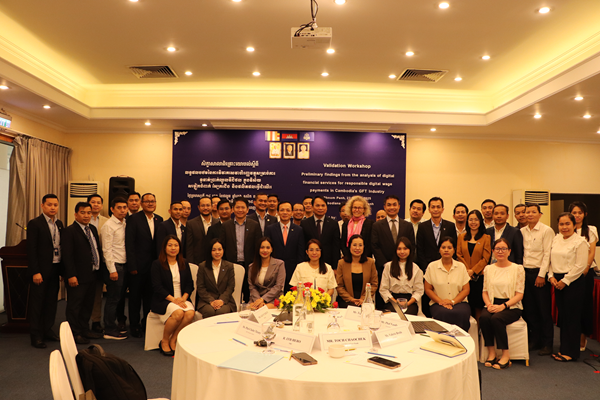Contact us: digitalwages@ilo.org
The Global Centre on Digital Wages for Decent Work launches second phase to expand responsible wage digitization efforts

The International Labour Organization’s (ILO) Global Centre on Digital Wages for Decent Work is proud to announce the launch of its second phase (2025-2027), building upon the successes of its foundational efforts from 2020 to 2024. With support from the Gates Foundation, the Centre will further scale responsible digital wage payment solutions, ensuring that low-income workers—especially women and vulnerable groups—gain greater financial inclusion and security.
Since its establishment in 2020, the Global Centre has led efforts to promote the transition from cash to responsible digital wage payments worldwide, positioning itself as a global leader in best practices, policy advocacy, and capacity-building. The first phase tested wage digitization initiatives in Cambodia, Indonesia, Peru, and the Philippines in close partnership with governments, employers and workers’ organizations, the financial sector, and liked-minded partners such as the ILO/IFC Better Work programme and the UN based Better Than Cash Alliance. It demonstrated how responsible wage digitization can increase financial inclusion by boosting account ownership, and improve payroll efficiency, and transparency. However, key barriers remain, including low financial service usage among workers, gaps in digital and financial literacy, limitations in digital and financial infrastructure, constraints in financial service offerings, and regulatory challenges.
To overcome these obstacles and enhance impact, the second phase will focus on expanding digital wages and associated financial services for low-income workers while strengthening enterprise capacity to implement a responsible transition.
The second phase will also introduce an additional country to the programme in South Asia or Africa and enhance the dissemination of evidence and tools to drive wage digitization efforts in other countries.
“The past four years have proven that responsible wage digitization is a powerful tool for financial inclusion, labour formalization, and enterprise efficiency. Our second phase will deepen these efforts, ensuring that many more workers and businesses benefit from secure, transparent, and inclusive digital wage solutions and associated financial services.”
– Craig Churchill, head of the ILO’s Social Finance Programme
The International Labour Organization is the United Nations agency for the world of work. We bring together governments, employers and workers to drive a human-centred approach to the future of work through employment creation, rights at work, social protection and social dialogue.
The ILO’s Social Finance Programme works with the financial sector to enable it to contribute to the ILO’s Decent Work Agenda. In this context, we engage with banks, microfinance institutions, credit unions, insurers, investors and others to test new financial products, approaches and processes.
